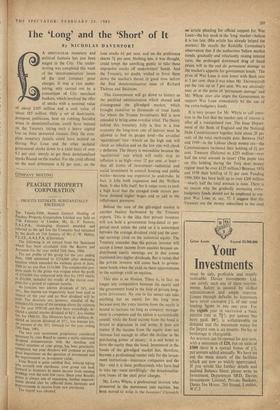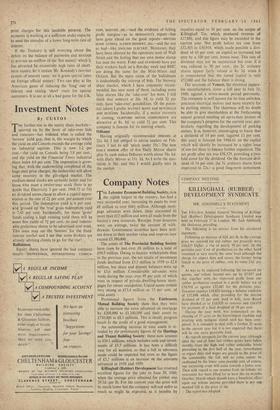The 'Long' and the `Short' of It
By NICHOLAS DAVENPORT
A SPECTACULAR monetary and political fantasia has just been staged in the City. The under- writing was completed this week of the 'denationalisation' issues of the steel company prior charges. It was a vast under- taking, ably carried out by a consortium of City merchant bankers, which involved the offer of stocks with a nominal value of about £105 million and a cash value of about £85 million. Only a set of doctrinaire, Pompous politicians, bent on rubbing Socialist noses in denationalisation, could have insisted on the Treasury taking such a heavy capital loss on these unwanted reissues. Only the com- plete monetary fanatic could have insisted on driving War Loan and the other undated government stocks down to a yield basis of over 6.1 per cent. merely to get these denationalised stocks floated on the market. For the yield offered on the steel debentures is 63 per cent., on the
loan stocks 61 per cent. and on the preference shares 7} per cent. Nothing less, it was thought, could tempt the unwilling public to take these unpopular stocks off underwriters' hands. And the Treasury, no doubt, wished to force them down the market's throat in good time before the final denationalisation issue of Richard Thomas and Baldwins.
This Government will go down to history as the purblind administration which abused and disintegrated the gilt-edged market, which brought ruination to thousands of trust funds for whom the Trustee Investments Bill is now intended to bring some overdue relief. The theory behind this monetary folly is that in a free economy the long-term rate of interest must be allowed to find its proper level—the so-called 'equilibrium' rate—which on the high side will check an inflation and on the low side will check r deflation. The theory is moonshine because the 'equilibrium' rate which will really stop an inflation is so high—over 12 per cent. at least— that all forms of investment—industrial and social investment in council housing and public works—become too expensive to undertake. In fact, it kills both expansion and the Welfare State. It also kills itself, for it raises rents to such a high level that the enraged trade unions per- force demand higher wages and so add to the inflationary pressures.
Behind the ruin of the gilt-edged market is another fantasy harboured by the Treasury experts. This is the idea that private investors will not hold a government long-dated or per- petual stock unless the yield on it is somewhere between the average dividend yield and the aver- age earnings yield on the ,industrial equity. The Treasury concedes that the private investor will accept a lower income from equities because un- distributed equity earnings are in due course translated into higher dividends. But it insists that the private investor will come back to govern- ment bonds when the yield on them approximates to the earnings yield on equities.
This also is an illusion. There is, in fact, no longer any competition between the equity and the government bond in the field of private long- term investment. No one in his senses can take anything but an equity for the long term because over the years income from the equity is bound to increase (as long as company manage- ment is competent and the nation is economically sound), while the fixed income from the bond is bound to depreciate in real terms. It does not matter if the income from the equity does not increase fast enough to offset the decline in the purchasing power of money : it is still better to have the equity than the bond. Investment in the bonds of the gilt-edged market has, therefore, become a professional matter only for the invest- ment institutions—insurance companies and the like—and it is these professionals who have had to take up—most unwillingly—the denationalisa- tion issues of the steel prior charges. • Mr. Lewis Whyte, a professional investor who pioneered in the movement into equities, has been moved to write in the Investors' Chronicle an article pleading for official support for War Loan—the key stock in the 'long' market—before it is too late. (His article has already helped the market.) He recalls the Radcliffe Committee's observation that if the authorities 'follow market trends, gradually and reluctantly raising interest rates, the prolonged downward drag of bond prices will in the end do permanent damage to the market's appetite for government bonds.' The price of War Loan is now lower with Bank rate at 5 per cent. than it was when Mr. Thorneycroft put the rate up to 7 per cent. We are obviously near or at the point of 'permanent damage' and Mr. Whyte inter alia urges the Government to support War Loan immediately by the use of the extra-budgetary funds.
It is very proper for Mr. Whyte to call atten- tion to the fact that the market rate of interest is after all a manipulated rate. The Issue Depart- ment of the Bank of England and the National Debt Commissioners together hold about 20 per cent. of the total marketable debt. Between 1947 and 1949—in the Labour cheap money era—the Commissioners increased their holding of 24 per cent. Treasury (Daltons) to £253 million—over half the total amount in issue! (The paper loss on this holding during the Tory dear money regime must be over £125 million.) Between 1954 and 1958 their holding of 31 per cent. Funding 1999-2004 has been built up to over £200 million —nearly half the total amount in issue. There is no reason why the gradually increasing extra- budgetary funds should not be employed to sup- port War Loan at, say, 57. I suggest that the Treasury use the money subscribed to the steel
prior charges for this laudable purpose. The economy is working at a sufficient under-capacity to need the stimulus of a lower long-term rate of interest.
If the Treasury is still worrying about the deficit on the balance of payments and anxious to prevent an outflow of the 'hot money' which it has attracted by excessively high rates of short- term money, let it imitate Mr. Kennedy's two-tier system of interest rates: let it grant special rates on foreign official money! Two can play at the American game of reducing the 'long' rate of interest and raising 'short' rates for special customers. It is not at all a bad game for the UK,







































 Previous page
Previous page